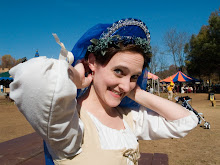I found that I was correct, however, at thinking the time period in which Memorial Day originated was the Civil War era. More commonly called "Decoration Day" before the end of World War II, the official start of Memorial Day was in 1868, by an order (General Order no. 11) of General John Logan, and it was observed May 30th of that year. That day flowers were placed upon the graves in Arlington National Cemetery of both Northern and Southern soliders who had died in the Civil War. What is perhaps unsurprising is that, while all the Northern states had adopted the Decoration Day/Memorial Day observance by 1890, Southern states didn't adopt it until after the next major war: World War I. Up until this point, the holiday had only commemorated those who had died in the Civil War; after World War I, this changed, so that Memorial Day commemorated any American soldier who died in any war. Of course, in addition to Memorial Day, many Southern states also celebrate another day to honor their Confederate dead exclusively. (Again, unsurprisingly.)
Another thing I wondered about Memorial Day is: why the red poppies? Well, that comes from a 1915 poem by Moina Michael, inspired by "In Flanders Fields":
We cherish too, the Poppy red
That grows on fields where valor led,
It seems to signal to the skies
That blood of heroes never dies.
After she wrote this, she started to encourge people to wear red poppies on Memorial Day, selling them and giving the money to soldiers who needed it. This tradition also started to spread to other countries, particularly early on to France and Belguim. Selling artificial red poppies made by orphans or disabled veterans in order to help them out became a tradition in those countries as well as in the United States. Moina Michael was honored in 1948 with a postage stamp.
In perusing some of the things written about Memorial Day, I became aware that, like many national celebrations and commemorations, the observance of the holiday as it was originally intended - to remember and honor our American heroes fallen in battle - appears to have been diminshed. Many of the sites I consulted bemoaned the 1971 passing of the "Uniform Holidays Bill", which created the national holiday three day weekend for several holidays. However, most of these have been returned to their original days of observance (for example, Veterans Day on November 11th). Memorial Day most likely remains part of the three day weekend tradition because a number of people see it as marking summer vacation season.
Why might this be a bad thing? Well, the argument on many of the sites - and in several national movements (one of which I mentioned on the site in the first paragraph) - including a page called "A Memorial Day History Lesson", is that the three day weekend at the beginning of summer have made people more intent on their holiday plans for the beach or the mountains or their staycation than on the commemoration of those who died to make and keep our country free. In a way, that may be true. However, in my humble opinion, it's not necessarily the three day vacation that stands in the way of proper Memorial Day observance. It's the wider and more prevailing decline of the appreciation and interest for history and commemoration of national holidays among the citizens of this country in general. For example, if one took a look at statistics of visits to National Memorials, museums, and other historical sites, one would see a fairly dramatic drop in the past few decades from what visitation used to be. And those who still go hope to be entertained and amused; if they aren't, they don't stay very long, or they don't go at all. Conversely, in years past, people visited national historical sites with the air of pilgrimage and reverence. That is rarely ever the case these days.
Honestly, I don't think taking away the three day vacation is going to do anything to change the disinterest and sense of detachment that Americans feel to the traditions of Memorial Day. Will they stop and commemorate on a random day in the middle of the week any better than they do on this three day weekend? To me that's looking at the issue from the wrong angle. The problem is not one of timing, it's of making citizens feel connected to their own roots, history, and national celebrations. If Americans felt a deeper appreciation and attachment to the holiday as a whole, I don't think it would matter where they were vacationing or what they were doing, they would stop and honor the fallen soldiers of this country.
In this era where so many talk of "patriotism" and national pride, is there a real movement toward appreciation for this country and its history in all its richness and diversity, or is this talk just that - talk? From what I've seen, it appears, sadly, to be the latter.
